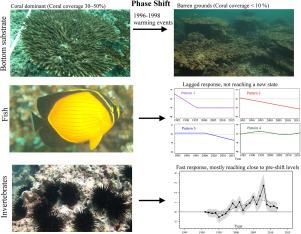Science of the Total Environment ( IF 8.2 ) Pub Date : 2020-09-15 , DOI: 10.1016/j.scitotenv.2020.142254 Yu-Jia Lin , Lotfi Rabaoui , Abdullajid Usama Basali , Maclopez Lopez , Reynaldo Lindo , Periyadan K. Krishnakumar , Mohammad A. Qurban , Perdana K. Prihartato , Diego Lozano Cortes , Ali Qasem , Khalid Al-Abdulkader , Ruben H. Roa-Ureta

|
The Arabian Gulf is a natural laboratory for examining the consequences of large-scale disturbances due to global warming on coral reef ecosystems because of its extreme temperature regime. Using a coral reef monitoring time series extending from 1985 to 2015, we examined the long-term ecological changes in fish and macro-invertebrate communities as these habitats suffered heat shocks. We used a GLMM modelling framework to obtain clean annual signals in community indicators from noisy data. We also visualized temporal change in the taxonomic composition of fishes and macro-invertebrates. A phase shift from predominantly reef-building corals to barren grounds occurred between 1996 and 2000. Macro-invertebrates responded rapidly, and most of associated indicators recovered to pre-shift levels in 15 years. Fishes generally had lagged responses to the phase shift and had shifted to a new state with lower abundance, as well as different species composition. Increased levels of herbivory first by macro-invertebrates, mostly sea urchins, and then fishes, could have suppressed macro-algae expansion and consequently led to the dominance of barren ground. When the phase shift occurred, most of the 14 fish families declined in abundance while macro-invertebrate groups increased. Fish families able to utilize non-coral habitats appeared more resilient to the disturbances and subsequent coral degradation. Unlike other regions, we observed high resilience of the coral-dependent butterflyfishes to coral loss, possibly due to local migration from other less-impacted coral reefs. We hypothesized a top-down control mechanism mediated by predation by fishes has contributed to shaping the temporal and spatial patterns of the macro-invertebrates. Our results also revealed differences in spatial preferences among fishes and macro-invertebrate groups, which could be used to set priorities and develop effective conservation and management strategies.
中文翻译:

世界上最温暖的珊瑚礁中鱼类和大型无脊椎动物的长期生态变化
阿拉伯湾是一个天然实验室,用于检查由于极端温度条件而导致的全球变暖对珊瑚礁生态系统造成的大规模干扰的后果。使用从1985年到2015年的珊瑚礁监测时间序列,我们研究了鱼类和大型无脊椎动物群落的生境遭受热冲击后的长期生态变化。我们使用GLMM建模框架从嘈杂的数据中获取社区指标中的干净年度信号。我们还可视化了鱼类和大型无脊椎动物的生物分类组成的时间变化。从主要的造礁珊瑚到荒芜的土地发生了相变。1996年至2000年,大型无脊椎动物反应迅速,并且大多数相关指标在15年内恢复到转变前的水平。鱼类通常对相移反应滞后,并以较低的丰度以及不同的物种组成转移到新状态。首先,大型无脊椎动物(主要是海胆),然后是鱼类的食草水平提高,可能抑制了大型藻类的扩张,因此导致了贫瘠土地的统治地位。当发生相移时,14个鱼类中的大多数鱼类丰度下降,而大型无脊椎动物种群增加。能够利用非珊瑚生境的鱼类家族似乎对干扰和随后的珊瑚退化更具抵抗力。与其他地区不同,我们观察到依赖珊瑚的蝴蝶鱼对珊瑚损失的恢复能力很高,这可能是由于其他受影响较小的珊瑚礁向当地迁移所致。我们假设鱼类捕食介导的自上而下的控制机制有助于塑造大型无脊椎动物的时空格局。我们的研究结果还揭示了鱼类和大型无脊椎动物种群在空间偏好上的差异,这些差异可用于设定优先级并制定有效的保护和管理策略。











































 京公网安备 11010802027423号
京公网安备 11010802027423号